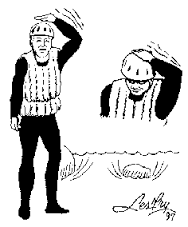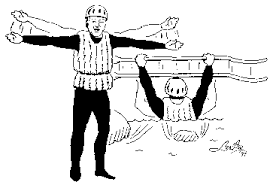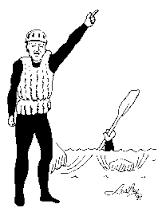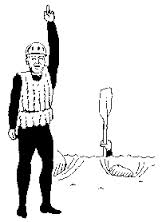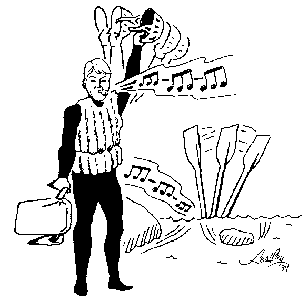Whitewater is very noisy. We typically use hand/paddle signals to communicate with boaters and rescuers. Everyone should carry a decent safety whistle. One blast means "I need your attention", three blasts is the universal distress/danger signal. What do you do if you hear two blasts? Assume you missed one and prepare to get off the river immediately: Look, Listen, Plan/Act. These days, it isn't a bad idea to carry a cell phone in a dry bag just in case. Here is a nice article on AW River Signals: AW River Signals.
Hand and whistle signals
Besides signalling with paddles while on the water, sometimes it's more convenient to communicate via hand signals. Here are some of the most common ones:
|
I'm OK
|
STOP
|
Go That Way
|
All is Clear
|
Danger with Whistle Blasts
|
Cell phone or radio if appropriate
Most commercial concerns and many fire companies carry portable hand radios. These are great for communicating back to home base for a wide variety of purposes. Most boaters don't carry these but we should seriously consider carrying a cell phone in a very waterproof container (like a Pelican Box). Even if communication is sketchy down on the river, we are often able to hike up to a higher elevation or gain access to a nearby road. In some rescues, getting the help you need quickly can be a real life saver.
Something Seriously Wrong
We try to take all necessary precautions in this class but we are in a natural environment and sometimes nature throws us a curve ball. Webbing or rope underwater, a rock moves unexpectantly, equipment malfunctions, rope crosses the body in a bad spot like my neck - anything can happen. A "For Real" signal is a opractice we use. In general, this is three of anything: 3 whistles, repeated 3 bangs, 3 chops with the hand - whatever is easiest to perform. At this point, Instructors and Safety persons will kick into gear and implement a prompt rescue.
Whistle Etiquette
In general, we avoid the use of our whistles - especially in busy parks like the C&O Canal. Use the whistle only when necessary like a real incident. Extraneous whistle usage can lead to calls to the local fire company and waste their resources.
